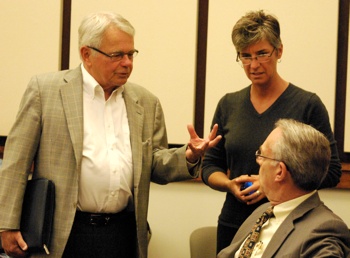Task Force: Millage, Endowment for Housing
An ambitious plan to help the homeless – by creating 500 or more units of housing with support services, paid for through a millage and endowment fund – was presented to Washtenaw County commissioners at their May 22 working session.

Former Washtenaw County administrator Bob Guenzel and Mary Jo Callan, director of the county’s office community & economic development, talk with former University of Michigan treasurer Norm Herbert before the start of the May 22, 2014 county board working session. Guenzel and Herbert are members of a task force on supportive housing. (Photos by the writer.)
The leadership team of the Task Force on Sustainable Revenues for Supportive Housing Services briefed commissioners on their recommendations, including the goal of building a $50 million endowment over 20 years. Payouts from the endowment would fund supportive services – such as treatment for mental illness and substance abuse – with the intent of addressing the root causes of homelessness. The concept is called permanent supportive housing, and is part of the community’s broader Blueprint to End Homelessness, which was created in 2004 and is being updated.
A possible millage – recommended at 0.25 mills, for no more than 20 years – would help fund supportive services while the endowment is built. County commissioners are being asked to consider putting such a millage on the ballot, possibly in 2015.
Former county administrator Bob Guenzel, a task force member, told commissioners that the task force believes this approach “is absolutely the right thing to do, to end homelessness and keep people housed. We feel very strongly about that. It’s a moral issue.” There’s also a strong business case for this approach when looking at the cost of emergency services and the criminal justice system, compared to the cost of permanent supportive housing, he said.
Several steps have already been taken to achieve these goals. An endowment was established in 2011, with $2.1 million in commitments so far. That amount includes a $1 million gift from the St. Joseph Mercy Health System to create the endowment, which is called the Sister Yvonne Gellise Fund for Supportive Services for Housing. Gellise is the former CEO of St. Joe’s. She’s on the task force and is a founding board member of the Washtenaw Housing Alliance. Another $1 million commitment comes from the Ann Arbor Area Community Foundation (AAACF), where the endowment is housed. AAACF Cheryl Elliott is another task force member. In addition, an anonymous donor has contributed $100,000.
The first fund distribution – of $26,100 – will be made this fall in a competitive grant process. AAACF’s distribution committee – an all-volunteer group – will be responsible for making grant recommendations.
AAACF is also helping provide a three-year, part-time development job to support fundraising for this endowment. Funding for the position will come from the Washtenaw Housing Alliance ($25,000), the AAACF ($5,000) and an anonymous donor ($10,000).
The foundation will post this position in early June, Elliott reported, with the intent of making a hire as soon as possible. The position would be in place until at least mid-2017. The employee will report to AAACF’s vice president for development and donor services, and to the Sister Yvonne Gellise Fund development committee. Members of that committee are the same people who’ve served on the leadership team of the task force, Elliott said. In addition to herself, members are Bob Chapman, Sister Yvonne Gellise, Bob Guenzel, Norm Herbert and Dave Lutton. They hope to get an additional two or three members, she said.
The next steps in this process include a request to the county board to sunset the task force at the June 4 board meeting. The board will also be asked to consider the task force’s recommendation for a millage. “Please use this year and into 2015 to set a millage strategy,” Elliott said.
The task force also stressed the importance of a public outreach and education effort, to help build awareness and support for the endowment.
The task force presentation was attended by five of the county’s nine commissioners. During their discussion, Conan Smith (D-District 9) expressed interest in having the county bond for this initiative – either for the full $50 million, or some portion of that amount. The county now has a triple-A bond rating, Smith noted. [That news had been announced earlier in the day. In general, higher ratings allow organizations to secure better terms for borrowing funds.] “This gives us an opportunity… to actually have some real impact in the community,” Smith said.
Task force members indicated that they hadn’t considered the option of bonding, and Elliott had some concerns about whether it would be legal to use taxpayer dollars for an endowment. They plan to explore the possibility, including consultation with legal counsel. [Full Story]



